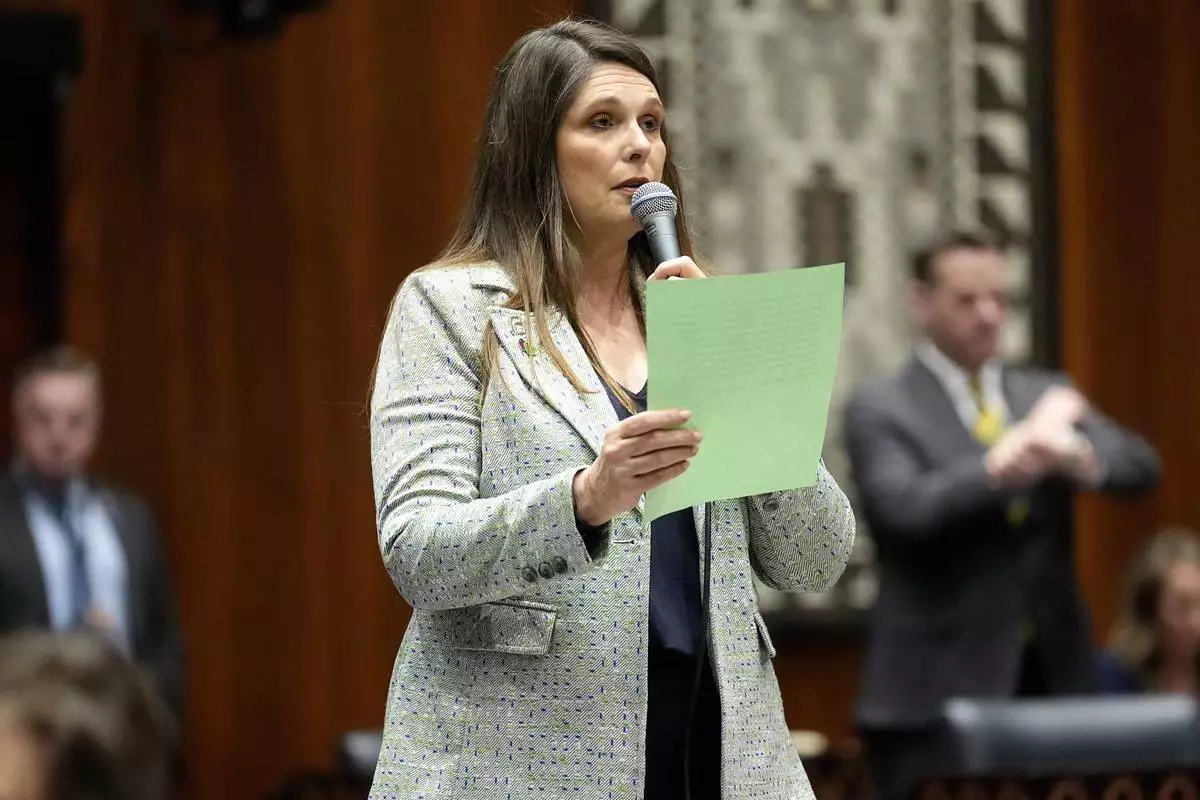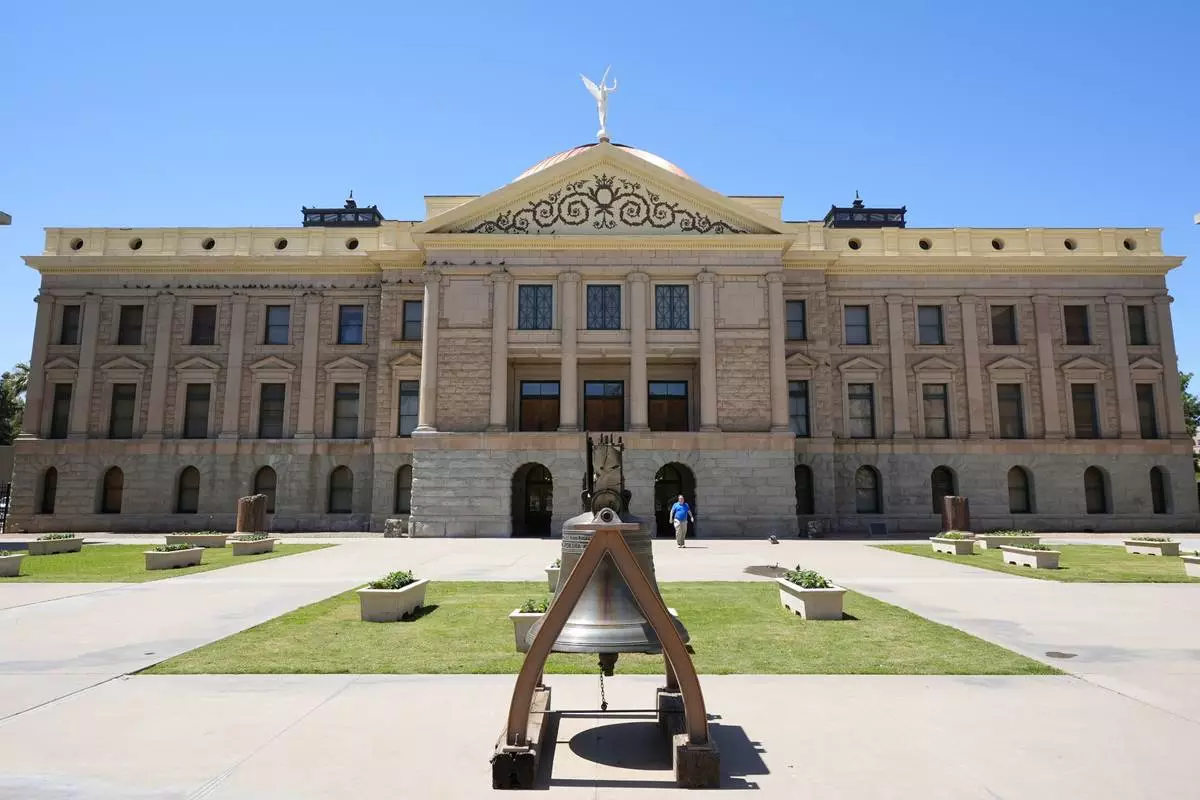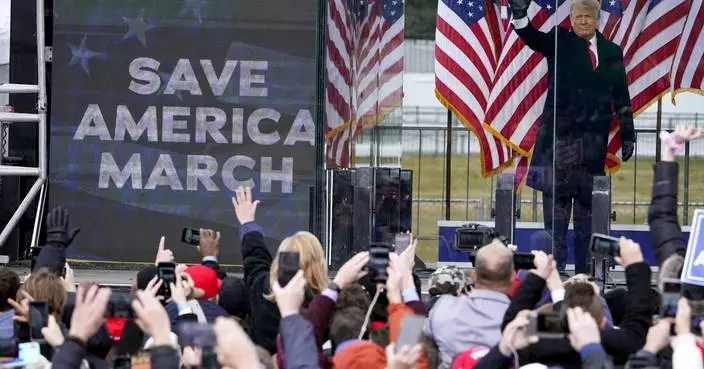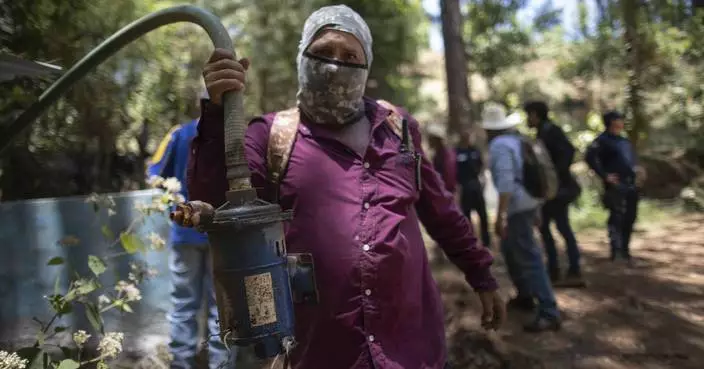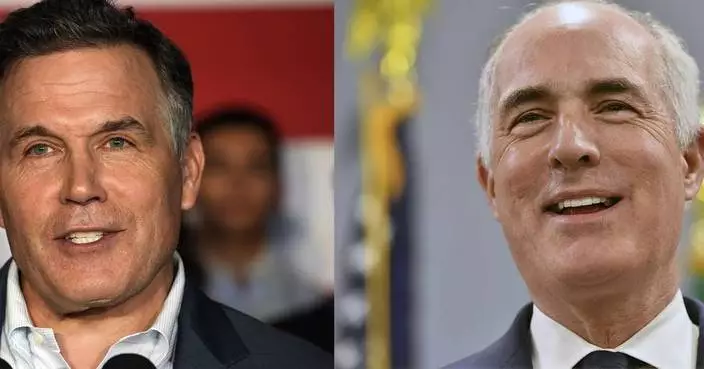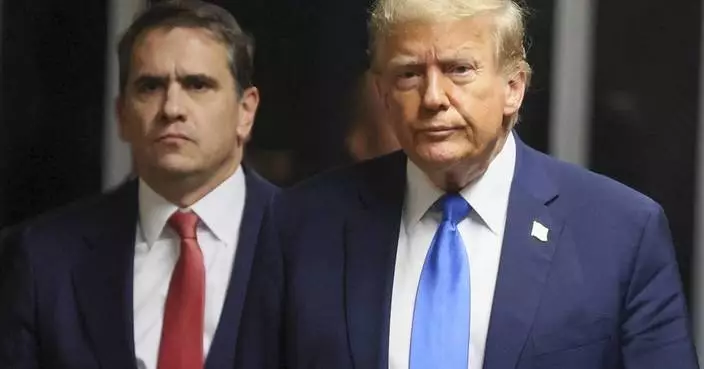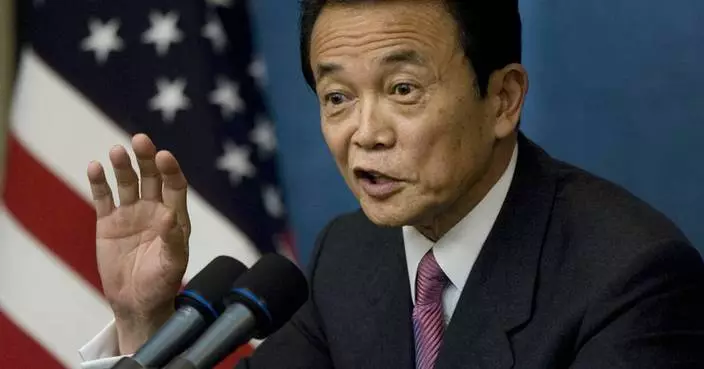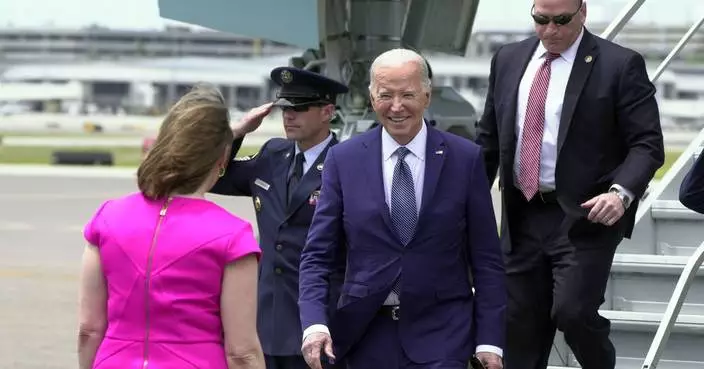President Donald Trump spent a second day Wednesday managing the political fallout from his widely criticized meeting with Russia's Vladimir Putin, shifting stances and mopping up what the White House said were misstatements.
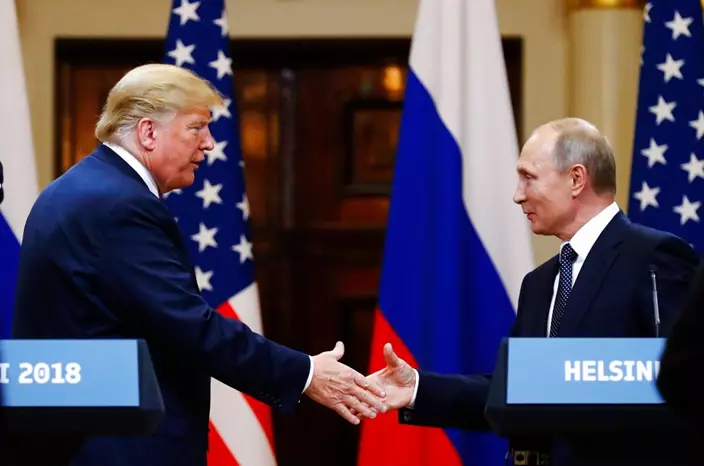
U.S. President Donald Trump shakes hand with Russian President Vladimir Putin at the end of the press conference after their meeting at the Presidential Palace in Helsinki, Finland, Monday, July 16, 2018. (AP Photo/Alexander Zemlianichenko)
His toughness with the longtime American foe in question, Trump said he told the Russian president face-to-face during Monday's summit to stay out of America's elections "and that's the way it's going to be."
That rhetoric marked a turnabout from Trump's first, upbeat description of his sit-down with Putin. Still, Trump backtracked on whether Russia is currently targeting U.S. elections. When asked the question Wednesday, he answered "no," a reply that put him sharply at odds with recent public warnings from his own intelligence chief.
Hours later, the White House stepped in to say Trump's answer wasn't what it appeared.
The zigzagging laid bare the White House's search for a path out of trouble that has dogged the administration's discussions of Russia from the start, but spiraled after Trump's trip to Helsinki. After days of criticism from both Democrats and Republicans, Trump — a politician who celebrates his brash political incorrectness — has appeared more sensitive than usual to outside opprobrium.
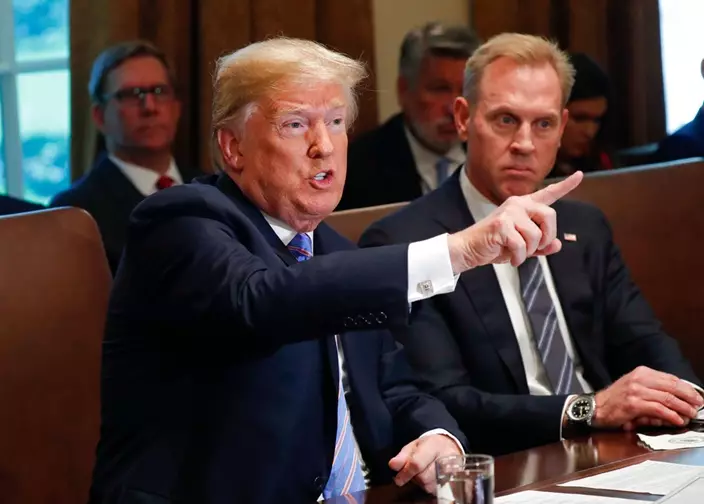
President Donald Trump gestures while speaking during his meeting with members of his cabinet in Cabinet Room of the White House in Washington, Wednesday, July 18, 2018. Looking on is Deputy Secretary of Defense Patrick Shanahan. (AP Photo/Pablo Martinez Monsivais)
The scale of the bipartisan outcry at Trump's stance toward Putin has only been rivaled by his 2017 waffling over condemning white supremacist demonstrators in Charlottesville, Virginia.
"I let him know we can't have this," Trump told CBS News of his conversations with Putin. "We're not going to have it, and that's the way it's going to be."
Would he hold Putin personally responsible for further election interference? "I would, because he's in charge of the country."
The CBS interview came at the end of two days of shifting statements.
On Monday, Trump appeared to question the findings of U.S. intelligence agencies that Russia interfered in the 2016 election.
His reservations, expressed 18 months into his presidency and as he stood standing next to Putin on foreign soil, prompted blistering criticism at home, even from prominent fellow Republicans.
On Tuesday, he delivered a scripted statement to "clarify" — his word — his remarks Monday. He said he misspoke by one word when he said he saw no reason to believe Russia had interfered in the 2016 U.S. election.
On Wednesday, he was asked during a Cabinet meeting if Russia was still targeting the U.S., and he answered "no" without elaborating. That came just days after National Intelligence Director Dan Coats sounded an alarm, comparing the cyberthreat today to the way U.S. officials said before 9/11 that intelligence channels were "blinking red" with warning signs that a terror attack was imminent.
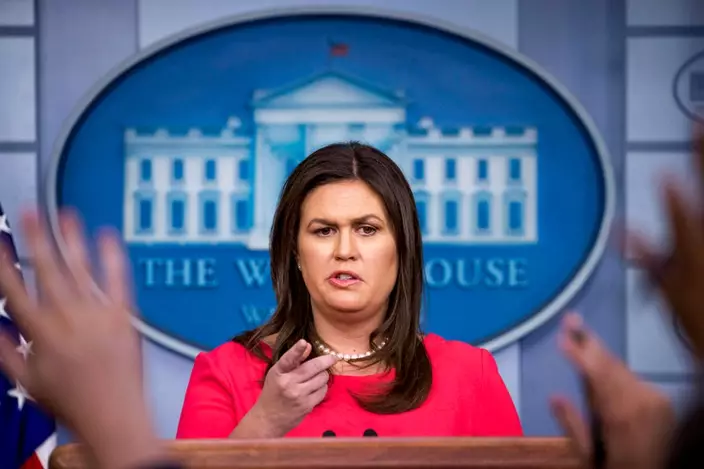
White House press secretary Sarah Huckabee Sanders calls on a member of the media during the daily press briefing at the White House, Wednesday, July 18, 2018, in Washington. (AP Photo/Andrew Harnik)
White House press secretary Sarah Huckabee Sanders said later Wednesday that Trump actually was saying "no" to answering additional questions — even though he subsequently went on to address Russia.
"The president is wrong," GOP Sen. Susan Collins of Maine said of Trump's one-word response. Told that Sanders had since clarified, she responded: "There's a walk-back of the walk-back of the walk-back of the walk-back? This is dizzying."
Trump has refined and sharpened his presentation in the two days since Helsinki.
At the news conference with Putin, he was asked if he would denounce what happened in 2016 and warn Putin never to do it again, and he did not directly answer. Instead, he went into a rambling response, including demands for investigation of Hillary Clinton's email server and his description of Putin's "extremely strong and powerful" denial of meddling.
Trump asserted Wednesday at the White House that no other American president has been as tough on Russia. He cited U.S. sanctions and the expulsion of alleged Russian spies from the U.S., telling reporters that Putin "understands it, and he's not happy about it."
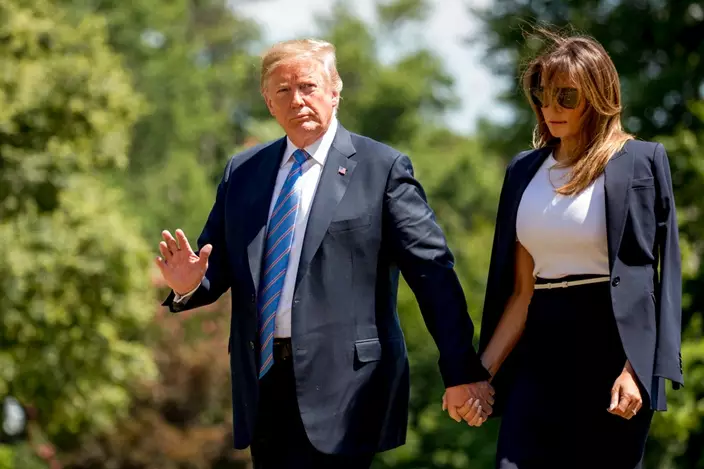
President Donald Trump, accompanied by first lady Melania Trump, waves to members of the media as they arrive on the South Lawn of the White House in Washington, Wednesday, July 18, 2018. The president and the first lady are returning from Andrews Air Force Base, after paying their respects to the family of fallen U.S. Secret Service special agent Nole Edward Remagen who suffered a stroke while on duty in Scotland. (AP Photo/Andrew Harnik)
The muddied waters have deepened critics' concerns that Trump is not taking threats to the U.S. electoral system seriously enough. Pressed on why Trump has repeatedly passed on opportunities to publicly condemn Putin's actions, Sanders suggested Trump was working to make the most of an "opportunity" for the two leaders to work together on shared interests.
One such opportunity is what Trump termed an "incredible offer" from Putin to allow the U.S. access to Russians accused of election hacking and other interference. In exchange, Putin wants Russian interviews of Americans accused by the Kremlin of unspecified crimes.
Sanders said Trump was still weighing the offer with his team, adding, "We've committed to nothing." Russian officials have said they want to interview Kremlin critics Bill Browder and former U.S. Ambassador to Russia Michael McFaul.
McFaul tweeted Wednesday that he hoped the White House would denounce "this ridiculous request from Putin."
Lawmakers have urged Trump to reject the deal.
"We're going to make sure that Congress does everything it can to protect this country," said Sen. Cory Gardner, R-Colo., who heads up the GOP's campaign arm.
A number of senators are swiftly signing on to a bipartisan bill from Sens. Marco Rubio, R-Fla., and Chris Van Hollen, D-Md., that would slap new sanctions on Russia or any other country caught posting ads, running fake news or otherwise interfering with election infrastructure.
Sanders called the legislation "hypothetical" and declined to say whether the president would back it.
Van Hollen said Trump "isn't willing to protect the integrity of our democracy in the United States, so Congress has to act."
Two other lawmakers, Sens. Jeff Flake, R-Ariz., and Chris Coons, D-Del., will try to force a vote Thursday on a resolution backing the intelligence community's findings that Russia interfered in the 2016 election and must be held accountable. A similar House vote Tuesday failed on a party-line vote.
The Republican chairman of the Senate intelligence committee, Richard Burr of South Carolina, said if Trump doubts that Russia would again try to intervene, "He needs to read the intelligence."
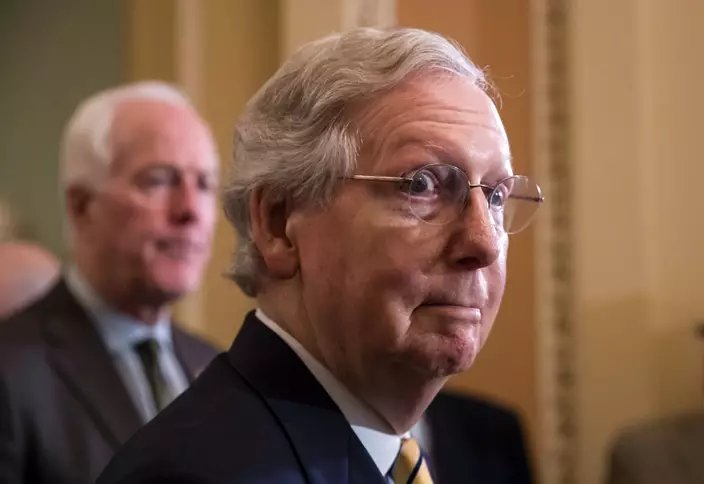
Senate Majority Leader Mitch McConnell, R-Ky., joined at left by Majority Whip John Cornyn, R-Texas, speaks to the media on Capitol Hill in Washington, Tuesday, July 17, 2018. McConnell says there is "indisputable evidence" Russia tried to affect the 2016 presidential election. He says the Senate understands the "Russia threat" and that is the "widespread view here in the United States Senate among members of both parties." (AP Photo/J. Scott Applewhite)
At the Hudson Institute think tank in Washington last Friday, Coats said, "We are not yet seeing the kind of electoral interference in specific states and voter data bases that we experienced in 2016; however, we fully realize that we are just one click on a keyboard away from a similar situation repeating itself."
His comments came the same day the Justice Department unveiled an indictment against 12 Russian military intelligence officers for their role in hacking Democratic groups during the 2016 campaign.
"The president was flat out wrong," Michael Morell, former deputy and acting director of the CIA said about Trump's remarks after the Cabinet meeting. "The Russians continue to interfere in our democracy. In fact, they never stopped."
Contrary to the U.S. government's fears leading up to the 2016 president election, hacking the nation's election infrastructure appeared to take a back seat to stealing and leaking salacious documents from the Democratic National Committee and House Democrats' campaign arm.
The success of the apparent dress rehearsal does not bode well for the upcoming election cycles in 2018 and 2020, as intelligence leaders have noted the ongoing and increasing threat by Russian hackers.
Federal officials ultimately determined that at least 18 states had their election systems targeted in some fashion, and possibly up to 21 found scanning of their networks for possible vulnerabilities, according to a report issued by the Senate Select Committee on Intelligence in May.



